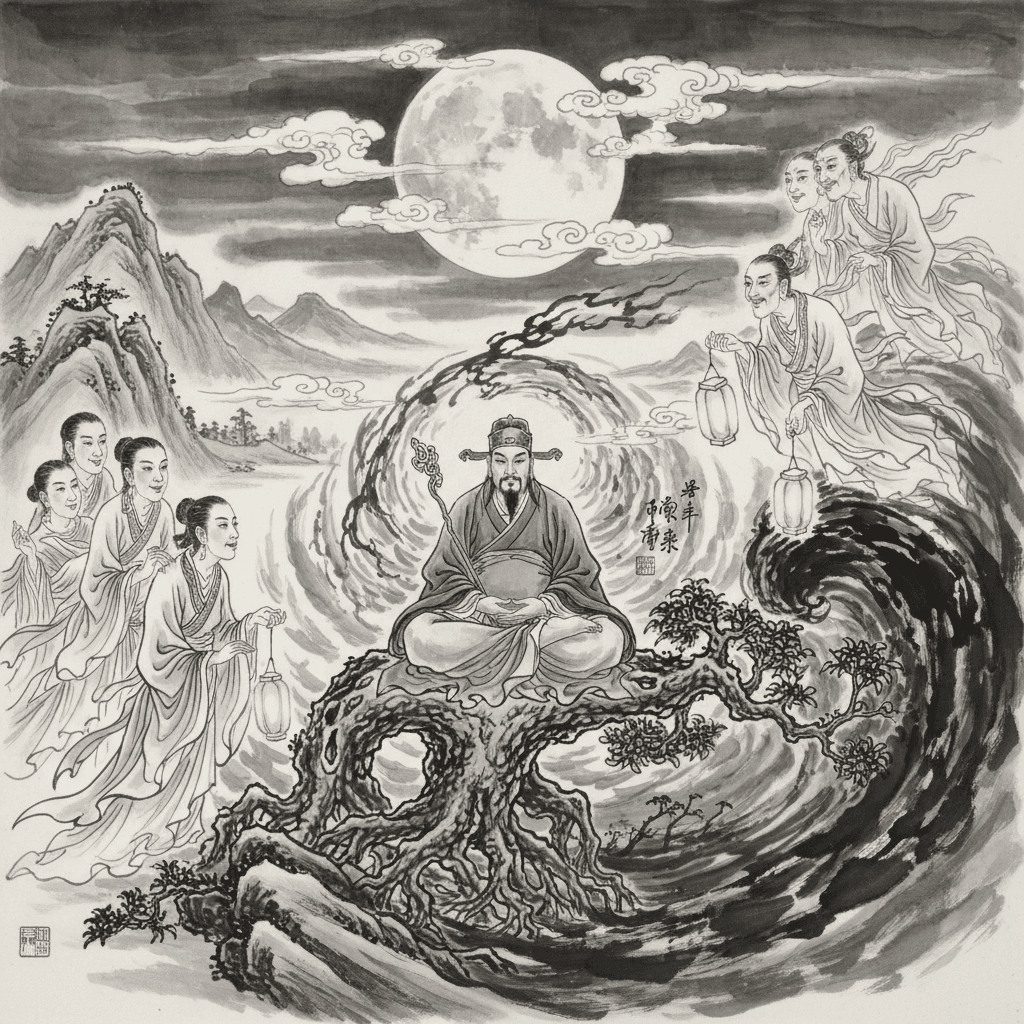The Pacification of Ghosts - Chapter One: Ten Thousand Souls County
After completing his demon-slaying missions, Zhong Kui had returned to the underworld. But peace was short-lived. King Yama summoned him with an unu...

After completing his demon-slaying missions, Zhong Kui had returned to the underworld. But peace was short-lived. King Yama summoned him with an unusual problem.
"Wan Min County (Ten Thousand People County) has become a gathering place for ghosts, but these aren't evil demons. They're simply lost souls who refuse to move on. They gather at night to admire the moon, mimicking the activities of the living."
This was a delicate situation. These ghosts weren't harming anyone directly, but their presence was disrupting the natural order between life and death.
When Zhong Kui arrived at Wan Min County, he discovered an extraordinary sight. The county had essentially become two places occupying the same space—a living town by day and a ghost town by night.
The ghosts had organized themselves into a mirror society. They had ghost merchants selling memories, ghost officials administering phantom laws, and ghost families maintaining households that existed only in spiritual form.
"This is unprecedented," Han Yuan observed. "They're not haunting or possessing—they're simply refusing to leave, creating their own existence parallel to the living world."
The leader of these ghosts was a former county magistrate who had died three years prior but refused to pass on. He still wore his official robes, though they were now translucent and flickered like moonlight on water.
"Lord Zhong Kui," the ghost magistrate said, bowing respectfully, "we are not rebels or demons. We simply wish to continue our existence. Death came too soon for all of us—we have unfinished business, incomplete stories."
The ghosts had organized a moon-viewing festival, a tradition from their living days. They invited Zhong Kui to attend, hoping to show him that their presence was harmless.
Under the full moon, hundreds of ghosts gathered in the county square. They had ghost wine (distilled from memories of wine), ghost food (the essence of meals remembered), and ghost music (melodies that played directly in the soul rather than the ears).
It was beautiful and sad simultaneously—a desperate attempt to cling to life's pleasures after life had ended.
While the gathering seemed peaceful, Zhong Kui noticed disturbing signs. The living residents of the county were becoming increasingly affected:
- Children were beginning to see and play with ghost children during daylight
- Adults were growing listless, their life force slowly draining from proximity to so many spirits
- The boundary between life and death was thinning dangerously
"You see harmony," Zhong Kui told the ghost magistrate, "but I see disorder. The living and dead must remain separate, not from cruelty but from necessity. Your presence here, however peaceful, is poisoning the natural order."
The ghosts presented their case passionately:
A ghost mother argued, "I stay to watch over my children. Is maternal love a crime?"
A ghost merchant reasoned, "I owe debts that death didn't cancel. Should I not honor them?"
A ghost scholar pleaded, "My life's work remains unfinished. Should knowledge die with the flesh?"
These weren't evil spirits but souls caught between duty and death, love and law, purpose and passing.
As Zhong Kui investigated further, he discovered a more serious problem. The gathering of so many ghosts in one place was creating a spiritual vortex that was attracting darker entities.
Evil spirits and demons were beginning to notice this weakness in the boundary between worlds. If the situation continued, Wan Min County could become a gateway for malevolent forces to enter the mortal realm.
Zhong Kui realized this situation required a different approach than his usual demon-slaying methods. These ghosts needed to be convinced, not conquered; counseled, not condemned.
"I will help you," he announced to the assembled ghosts, "but not in the way you hope. I will help you find peace, complete your unfinished business, and move on to your proper rest. This is not cruelty—it is compassion."
Some ghosts were receptive, others resistant. The ghost magistrate was particularly stubborn: "You ask us to abandon everything we've built here, our second chance at existence."
"I ask you to accept the natural order," Zhong Kui replied. "Death is not an ending but a transformation. By clinging to your old existence, you prevent your own evolution and harm those you claim to love."
As the moon set and the ghosts faded with the dawn, Zhong Kui knew this would be his most challenging mission yet. Fighting demons was straightforward—they were evil and needed to be destroyed. But these ghosts were simply lost, confused, and afraid.
The pacification of ghosts would require patience, wisdom, and understanding—qualities that would test even the great Zhong Kui's divine abilities.
